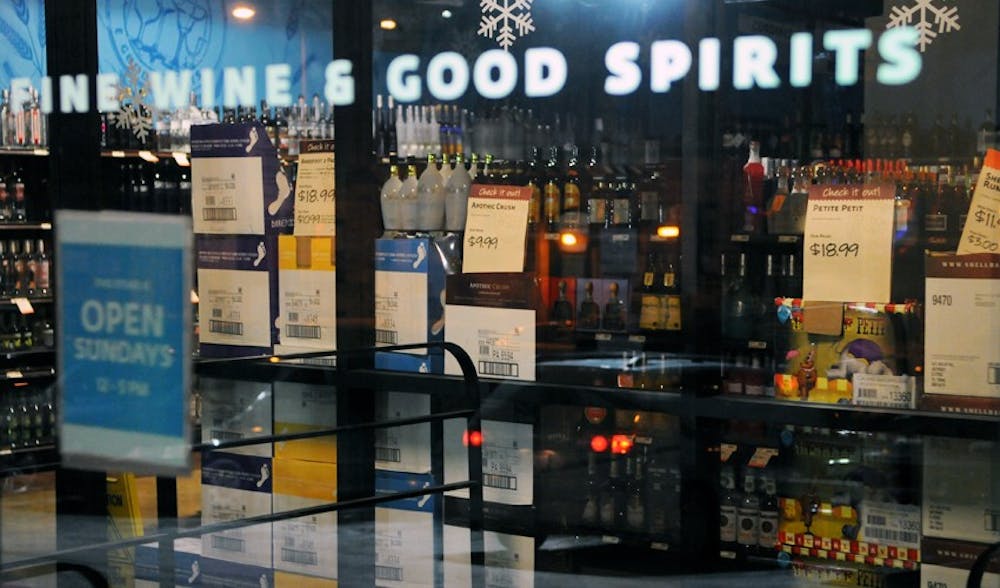
The House Liquor Control Committee voted 15–10 along party lines to pass a bill that would privatize Pennsylvania’s state-run liquor stores system, which would make the price of alcohol drop.
Credit: Joyce VarmaPenn students might be quick to support a recent Republican proposal in the Pennsylvania House of Representatives: more liquor stores and cheaper alcohol.
House Majority Leader Dave Reed (R-Indiana County) announced a bill last week to privatize Pennsylvania liquor stores, which House Republicans hope to vote on and pass on Feb. 23. If passed by the House and Senate and signed by the Governor, it would phase out Pennsylvania state-run liquor stores by selling them to private distributors. It would also authorize 1,200 liquor licenses in the state.
The high prices and few locations of current state-run liquor stores have driven Penn students out of the state in search of cheap liquor. “I probably go to Delaware for alcohol several times per month,” said a College senior who preferred to remain anonymous since he often supplies alcohol to minors. “The main reason is that it’s cheaper and you can buy it in bulk. A cheap handle of alcohol in Delaware is about 10 or 11 dollars, and in Pennsylvania ... it’s like 16 or 17.”
“For a 25 minute drive there and back, it’s like five dollars worth of gas money, and you easily save that much in one handle,” he added. “So if you are buying a thousand dollars worth of champagne or beer, the trip [to Delaware] is totally worth it.”
While House Republicans’ motivation for the proposal is balancing the state budget rather than making alcohol more available, privatizing Pennsylvania’s state-run liquor stores would drastically alter the market for alcohol in the state.
“We thought this was a good opportunity to put a potential revenue source on the table for the budget discussions,” Reed said in the Capitol last Tuesday. “We’re very confident we’ll be passing a liquor bill.”
Reed estimated revenue from selling state-owned liquor stores would bring in over $1 billion for the state.
While the bill has a strong chance of passing through the Republican-controlled House and Senate, Pennsylvania Gov. Tom Wolf, who will ultimately need to sign the bill for it to become law, has indicated his support for “modernization” of liquor stores instead of privatization.
“An alternative is modernization, which would mean more convenience for customers, longer hours, more flexible pricing and better location of stores,” said Bill Patton, press secretary for House Minority Leader Frank Dermody (D-Allegheny), who opposes the privatization proposal. He added that state-run liquor stores provide a steady stream of tax revenue to the state and employ over 4,000 workers.
This is not the first time House Republicans have pushed for privatization. In March 2013, the House voted 105-90, with all Democrats opposing, to pass a similar liquor store privatization bill. The State Senate did not to bring the bill to vote.
The idea of full privatization might be divisive in the state legislature, but Pennsylvanians support it in a bipartisan manner. A poll conducted by the Commonwealth Foundation in October 2013 found that 66 percent of likely Pennsylvanian voters want to privatize the state-run liquor store system.
“If I had a guess, if they do anything, I think it would be modernization,” said Terry Madonna, director of Franklin & Marshall College’s Center for Politics and Public Affairs. “I don’t think you could rule out that type of a compromise. That could mean you keep the liquor operation in state hands through the control board, but you privatize through leases the sale of wine, beer and spirits to lots of private sector venues.”
Patton agreed compromise is a likely outcome.
“There is a new Democratic governor,” Patton said, “and several of the new Republican leaders have said very encouraging things about working together to address the big challenges that Pennsylvania faces.”
The Daily Pennsylvanian is an independent, student-run newspaper. Please consider making a donation to support the coverage that shapes the University. Your generosity ensures a future of strong journalism at Penn.
DonatePlease note All comments are eligible for publication in The Daily Pennsylvanian.








